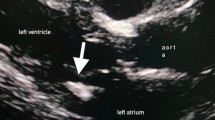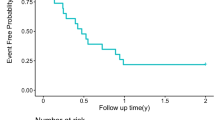Abstract
An increase in the volume and pressure of the heart chambers has been shown to increase liver stiffness. The Albumin-Bilirubin (ALBI) score is useful and easy-to-use for objectively assessing liver function. There is no information in the literature regarding changes in ALBI scores in patients with rheumatic mitral stenosis (MS). The aim of our study was to investigate changes in ALBI score and its clinical impact in patients with MS. Of the 247 patients analyzed, 54 were excluded from the study. The remaining 193 patients with MS were divided into two groups: Group I (64 patients with mitral valve area > 1.5 cm2 and mean transmitral gradient < 10 mmHg) and Group II (129 patients with mitral valve area ≤ 1.5 cm2 and mean transmitral gradient ≥ 10 mmHg). The ALBI score was calculated based on serum albumin and total bilirubin levels using the following formula: ALBI= (log10 bilirubin [µmol/L] × 0.66) + (albumin [g/L] × − 0.085). A significant correlation was found between the ALBI score and mitral valve area in patients with MS (r = − 0.479, p < 0.001*) (Table 4; Fig. 3A). An ALBI score greater than − 2.61 was associated with severe MS (mitral valve area < 1.5 cm2), with a sensitivity of 72% and a specificity of 69% (Area under the ROC curve = 0.726; p < 0.001; 95% CI 0.650–0.802) (Fig. 4A). A significant correlation was found between the ALBI score and mean transmitral gradient in patients with MS (r = 0.476; p < 0.001*) (Table 4; Fig. 3B). An ALBI score greater than − 2.57 was associated with severe MS (mean transmitral gradient < 10 mmHg), with a sensitivity of 65% and a specificity of 67% (Area under the ROC curve = 0.684; p < 0.001; 95% CI 0.608–0.759) (Fig. 4B). In multivariate linear regression analysis, mitral valve area and mean transmitral gradient were significantly associated with increased ALBI scores (p < 0.05). Mitral valve area, mean transmitral gradient, and NT-proBNP levels were significantly associated with the ALBI score. The ALBI score could provide an information about the severity of MS. The ALBI score is a simple, evidence-based, objective, and discriminatory method for assessing liver function in patients with MS.Please check and confirm that the authors and their respective affiliations have been correctly identified and amend if necessary.Authors and their respective affiliations are correctly identified.




Similar content being viewed by others
References
Eloi Marijon MD, Phalla Ou MD, Celermajer DS (2007) Prevalence of rheumatic heart disease detected by echocardiographic screening. N Engl J Med 357:470–476. https://doi.org/10.1056/NEJMoa065085
Pandian NG, Kim JK, Arias-Godinez JA et al (2023) Recommendations for the use of echocardiography in the evaluation of rheumatic heart disease: a report from the American Society of Echocardiography. J Am Soc Echocardiogr 36(1):3–28. https://doi.org/10.1016/j.echo.2022.10.009
Asrani SK, Nina S, Asrani DK, Freese SD, Phillips CA, Warnes J, Heimbach P, Kamath S (2012) Congenital heart disease and the liver. Hepatology 56(3):1160–1169. https://doi.org/10.1002/hep.25692
Toyoda H, Johnson PJ (2022) The ALBI score: from liver function in patients with HCC to a general measure of liver function. JHEP Rep 4(10):100557. https://doi.org/10.1016/j.jhepr.2022.100557
Kawata T, Ikeda A, Masuda H, Komatsu S (2021) Association between Albumin-Bilirubin score at admission and in-hospital mortality in patients with acute heart failure. Int Heart J 62(4):829–836. https://doi.org/10.1536/ihj.21-080
Duman ZM, Timur B (2023) Albumin-bilirubin score: a novel mortality predictor in valvular surgery. Braz J Cardiovasc Surg 38(2):271–277
Evlice M, Bedir Ö, Coşkun M et al (2023) The relationship between echocardiographic parameters and albumin bilirubin (ALBI) score in patients with isolated secundum type atrial septal defect. Echocardiography 40(4):350–358. https://doi.org/10.1111/echo.15556
Rockey DC (2008) Current and future anti-fibrotic therapies for chronic liver disease. Clin Liver Dis 12:4939–4962. https://doi.org/10.1016/j.cld.2008.07.011
Lebray P, Varnous S, Charlotte F, Varaut A, Poynard T, Ratziu V (2008) Liver stiffness is an unreliable marker of liver fibrosis in patients with cardiac insufficiency. Hepatology 48(6):2089. https://doi.org/10.1002/hep.22594
Chon YE, Kim SU, Park JY et al (2014) Dynamics of the liver stiffness value using transient elastography during the perioperative period in patients with valvular heart disease. PLoS ONE 9(3):e92795. https://doi.org/10.1371/journal.pone.0092795
Bravo AA, Sunil G, Sheth CS (2001) Liver biopsy. N Engl J Med 344(7):495–500. https://doi.org/10.1056/NEJM200102153440706
Nakashima M, Miyoshi T, Tanakaya M et al (2023) Prognostic value of the liver fibrosis marker fibrosis-5 index in patients with severe isolated tricuspid regurgitation: comparison with fibrosis-4 index. Heart Vessels. https://doi.org/10.1007/s00380-023-02268-3
Johnson PJ, Berhane S, Kagebayashi C et al (2015) Assessment of liver function in patients with hepatocellular carcinoma: a new evidence-based approach-the ALBI grade. J Clin Oncol 33(6):550–558. https://doi.org/10.1200/JCO.2014.57.9151
Hiraoka A, Kumada T, Kudo M et al (2017) Albumin-bilirubin (ALBI) grade as part of the evidence-based clinical practice guideline for HCC of the Japan Society of Hepatology: a comparison with the liver damage and child-pugh classifications. Liver Cancer 6(3):204–215. https://doi.org/10.1159/000452846
Suzuki K, Claggett B, Minamisawa M, Packer M, Zile MR, Rouleau J, Swedberg K et al (2020) Liver function and prognosis, and influence of sacubitril/valsartan in patients with heart failure with reduced ejection fraction. Eur J Heart Fail 22(9):1662–1671. https://doi.org/10.1002/ejhf.532
Biegus J, Hillege HL, Postmus D, Mattia AE, Valente DM, Bloomfield JGF, Cleland G et al (2016) Abnormal liver function tests in acute heart failure: relationship with clinical characteristics and outcome in the PROTECT study. Eur J Heart Fail 18:7830–7839. https://doi.org/10.1002/ejhf.532
Pinato DJ, Sharma R, Allara E, Yen C, Arizumi T, Kubota K, Bettinger D et al (2017) The ALBI grade provides objective hepatic reserve estimation across each BCLC stage of hepatocellular carcinoma. J Hepatol 66(2):338–346. https://doi.org/10.1016/j.jhep.2016.09.008
Chen Y, Seto WK, Ho LM et al (2016) Relation of tricuspid regurgitation to liver stiffness measured by transient elastography in patients with left-sided cardiac valve disease. Am J Cardiol 117(4):640–646. https://doi.org/10.1016/j.amjcard.2015.11.030
Matsue Y, Kagiyama N, Yamaguchi T et al (2020) Clinical and prognostic values of ALBI score in patients with acute heart failure. Heart Lung Circ 29(9):1328–1337. https://doi.org/10.1016/j.hlc.2019.12.003
Han S, Wang C, Tong F et al (2022) Prognostic impact of albumin-bilirubin score on the prediction of in-hospital mortality in patients with heart failure: a retrospective cohort study. BMJ Open 12(1):e049325. https://doi.org/10.1136/bmjopen-2021-049325
Yamada S, Kaneshiro T, Yoshihisa A et al (2021) Albumin-Bilirubin score for prediction of outcomes in heart failure patients treated with cardiac resynchronization therapy. J Clin Med 10(22):5378. https://doi.org/10.3390/jcm10225378
Funding
The authors have not disclosed any funding
Author information
Authors and Affiliations
Contributions
All authors whose names appear on the submission (1) made substantial contributions to the conception or design of the work; or the acquisition, analysis, or interpretation of data; or the creation of new software used in the work; (2) drafted the work or revised it critically for important intellectual content; (3) approved the version to be published; and (4) agree to be accountable for all aspects of the work in ensuring that questions related to the accuracy or integrity of any part of the work are appropriately investigated and resolved.* Based on/adapted from: ICMJE, Defining the Role of Authors and Contributors, Transparency in authors’ contributions and responsibilities to promote integrity in scientific publication, McNutt at all, PNAS February 27, 2018.
Corresponding author
Ethics declarations
Conflict of interest
None declared.
Additional information
Publisher’s Note
Springer Nature remains neutral with regard to jurisdictional claims in published maps and institutional affiliations.
Rights and permissions
Springer Nature or its licensor (e.g. a society or other partner) holds exclusive rights to this article under a publishing agreement with the author(s) or other rightsholder(s); author self-archiving of the accepted manuscript version of this article is solely governed by the terms of such publishing agreement and applicable law.
About this article
Cite this article
Bedir, Ö., Evlice, M. & Kurt, İ.H. Relationship between echocardiographic parameters and ALBI score in patients with rheumatic mitral stenosis. Int J Cardiovasc Imaging 40, 535–543 (2024). https://doi.org/10.1007/s10554-023-03021-7
Received:
Accepted:
Published:
Issue Date:
DOI: https://doi.org/10.1007/s10554-023-03021-7




